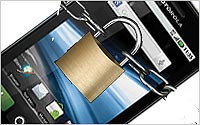Carrier IQ Loses Preliminary Round In Privacy Lawsuit
- by Wendy Davis @wendyndavis, May 21, 2012

A judge has ruled that software developer Carrier IQ must face claims that it violated California's relatively stringent privacy laws by allegedly logging keystrokes on mobile devices.
U.S. District Court Judge Gary Allen Feess rejected Carrier IQ's argument that federal wiretap laws trump California state laws about privacy.
Feess said that congressional reports about the federal wiretap law show that it was meant to "establish minimum standards and not to preempt state laws that meet these standards." Feess added that the "long-standing view" of other courts is that "states are free to enact legislation that is more restrictive than the federal law."
The decision marks a setback for Carrier IQ, which has been on the defensive since last November, when a researcher posted a video clip that appears to show the company logging keystrokes on a mobile phone. Several weeks after the clip emerged, Carrier IQ acknowledged that its software sometimes logs the contents of messages, but said that the data is encoded.
Carrier IQ characterized the logging as a bug and said the messages were not human readable. The company also said that its software was intended to help mobile carriers to discover the source of network problems, like dropped calls.
Still, the company was hit with dozens of potential class-action lawsuits. Many of those cases were filed in federal court and later consolidated in the Northern District of California. But two consumers, Cindy Leong and Carey Eckert, filed suit in state court in California.
Leong and Eckert allege that Carrier IQ violated California's invasion of privacy law, which prohibits anyone from intercepting communications without the consent of all parties. That law is seen as more favorable than the federal wiretap law for the consumers who are suing.
Carrier IQ attempted to bring the Leong and Eckert lawsuit to federal court, arguing that the state claims were trumped by federal law.
But Leong and Eckert opposed that effort, and Feess sided with them, ruling that they could proceed in state court. That decision, quietly issued late last month, has left Carrier IQ facing two separate lawsuits -- one in federal court and one in state court -- for the alleged keystroke logging.
The decision is notable because a different federal judge came to the opposite conclusion in a lawsuit against Google about its collection of WiFi data. In that case, U.S. District Court Judge James Ware dismissed claims that Google's Street View cars violated California law. Ware ruled that those claims were foreclosed by the federal wiretapping statute.
Feess said that the decision in the Street View case "ignores the great weight of authority holding that one of the principal purposes of the federal statute was to establish minimum standards."
A Carrier IQ spokesperson said the company would not comment on individual lawsuits, but belived the claims were "without merit" and will continue to defend itself in court.


